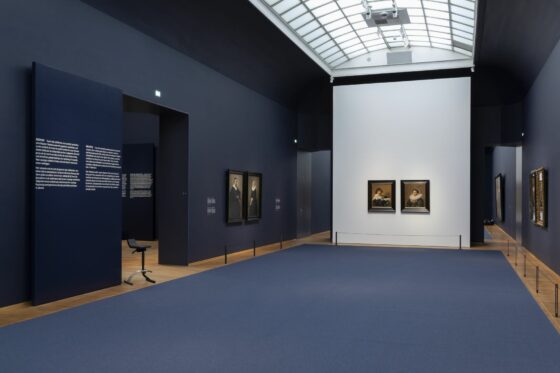Researchers at the Rijksmuseum have identified a married couple in portraits by 17th century master Frans Hals as the seven-times Amsterdam mayor of the time and his wife.
The discovery is unusual because often the great and the good of the Netherlands would have their portraits taken by a local painter.
However, a row between Hals and the Amsterdam militia which meant that he never finished a commissioned group portrait, Meagre Company, led to a gap in his diary. And the canny Amsterdammers, mayor Jan van de Poll and Duifje van Gerwen, apparently took their opportunity to commission him to make them a pair of portraits after they were married in 1637.
“They have been in the Rijksmuseum since it opened in 1885, and our director at the time gave them the names Nicolaes Hasselaer and Sara Wolphaerts van Diemen,” said Rijksmuseum curator of 17th century painting Jonathan Bikker. “In 2007, I was working on the permanent collection catalogue and I looked at those identifications and at that point I rejected them and made them ‘a portrait of a man and a portrait of a woman.’”
Documentation “utterly ruled out” the previous identification, he said, as did the line of inheritance from the bequest. But although there was no doubt they were by Frans Hals, he could see no connection with potential sitters like Van de Poll and Van Gerwen – even though there was a strong resemblance to two portraits of Van de Poll, one by Johann Spilberg in 1650 and another by Bartholomeus van der Helst in 1652.
Asked to reexamine the portraits for the current Rijksmuseum exhibition on Frans Hals, he looked again: “I discovered that the uncle of the woman who I think they portray had moved to Haarlem in the beginning of the 17th century, he was an alderman and brewer and became a mayor of Haarlem but he was also a sitter in a city guard portrait by Frans Hals in Haarlem,” he said.
Hals at the time was involved with a dispute with the Amsterdam militia who – unusually – had asked him to paint their portrait, possibly because of his artistic skill and possibly because of his attractive Haarlem rate of sixty guilders per head. But the painter refused to come to Amsterdam and the militia refused to go to him and despite a stiff exchange of legal letters and an offer of more money, there was deadlock.

“He said: ‘I’m not going to go to Amsterdam; you have to come to Haarlem,’” said Bikkers. “They said: ‘No way’, and they hired someone else who lived in the same district the same neighbourhood as they did. It’s right at that point that this couple does go to Haarlem to have their portraits painted. When you think about it, that was a very good choice.”
It is not known how they would have travelled, although an ultra-modern three hour barge service had recently launched between the cities. However they got there, the result is a pair of exquisite pendant marital portraits, which will soon travel to Berlin’s Gemäldegalerie for its exhibition on Frans Hals
In the meantime, the group portrait of the Amsterdam militia was completed by local painter Pieter Codde in 1637. “Those Amsterdam civic guardsmen were just very lazy,” added Bikker. “These are well-bodied people, not people with a handicap but soldiers, for crying out loud. And they can’t get on their horses and ride to Haarlem?”
Their loss – and apparently Van de Poll and Van Gerwen’s gain.

